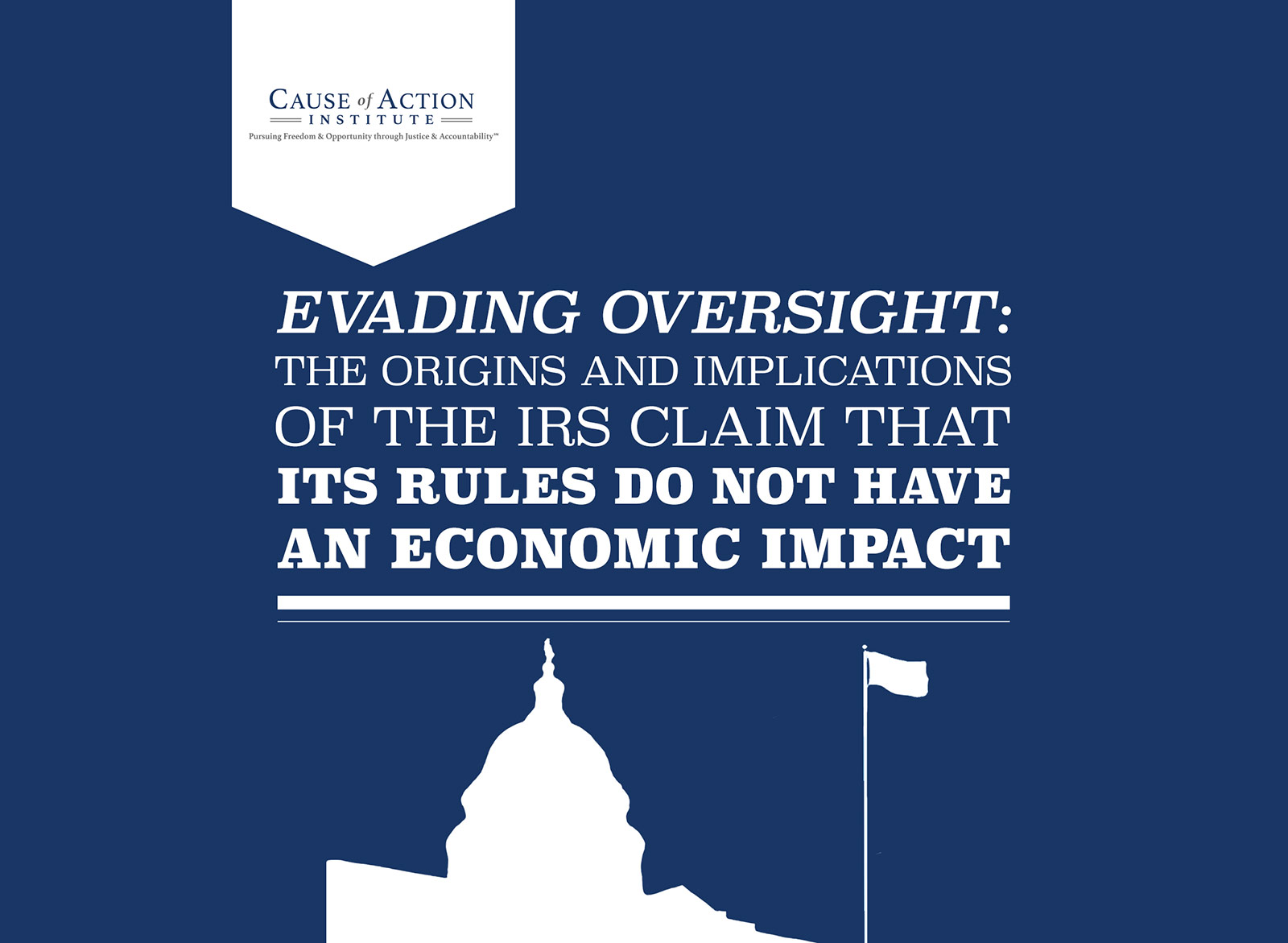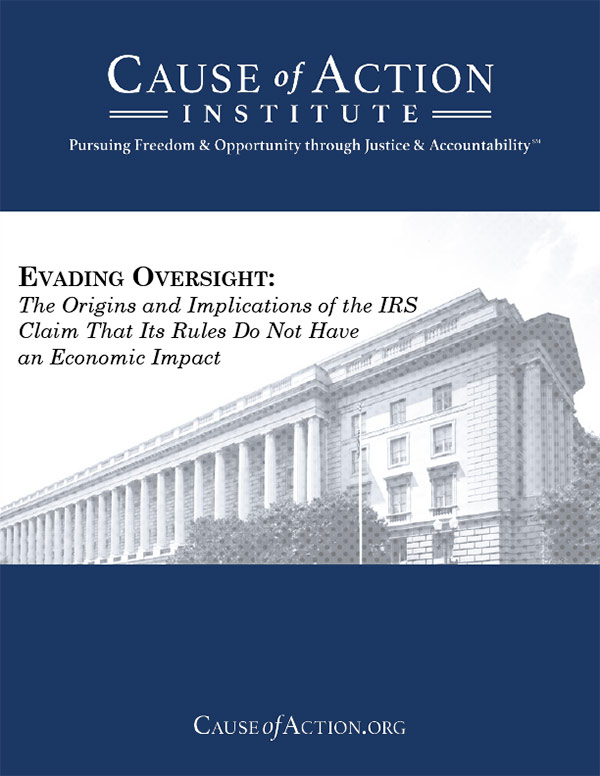Over the past two weeks, Senate Committee on Homeland Security and Governmental Affairs (“HSGAC”) Chairman Ron Johnson and HSGAC Subcommittee on Regulatory Affairs Chairman James Lankford have sent two letters to investigate the Internal Revenue Service (“IRS”) claim that any economic impact from the agency’s rules is due to the underlying statute and not its regulatory choices. Cause of Action Institute (“CoA Institute”) profiled the IRS claim, its implications, and the role of the White House Office of Information and Regulatory Affairs (“OIRA”) in a recent investigative report and op-ed.
HSGAC Letter to OIRA
On February 1, 2018, Chairmen Johnson and Lankford sent a letter to OIRA urging the White House regulatory office to reconsider a “longstanding agreement between [OIRA] and the Department of the Treasury to exempt regulations issued by the [IRS] from the requirements contained in Executive Order 12866.”
In 1983, OIRA, under President Reagan, agreed to create a three-tiered system to review IRS rules, which has resulted in very few IRS rules being sent to the White House regulatory office for pre-publication review.[1] The IRS finally released the long-secret agreement in response to a Freedom of Information Act request from CoA Institute. The Government Accountability Office (“GAO”) has also called for the agreement to be revisited.
In their letter, Chairmen Johnson and Lankford:
strongly urge[d] [OIRA] to revisit the regulatory agreement between OIRA and Treasury, as directed by President Trump’s EO 13789, with a critical eye as to why this agreement is necessary. [They] also encourage[d] OIRA to implement all the recommendations in GAO’s September 2016 report and provide a full explanation to the Committee and Subcommittee in the event that OIRA declines to implement any of GAO’s recommendations.
The Chairmen also announced that they “intend[] to hold an oversight hearing in the very near future regarding OIRA activities. The issues outlined in this letter will likely constitute a major part of this hearing.”
This effort is important because OIRA plays a key role in coordinating and legitimizing Executive Branch regulatory actions. If an agency is able to make federal regulatory policy without oversight from the President, that policy not only lacks independent review but also political legitimacy. OIRA is well-positioned to rein in the IRS and demand that the agency begin to do the same pre-publication regulatory cost-benefit analysis and economic-impact analysis as other federal agencies.
It will be interesting to hear OIRA Administrator Neomi Rao’s thoughts on the long-standing, long-secret memo at a congressional oversight hearing, as I do not believe OIRA as an institution has spoken on the issue since 1993. Hopefully, Administrator Rao will take this opportunity to review and end the agreement between OIRA and Treasury and bring the IRS into line with other agencies.
HSGAC Letter to IRS
In addition, on February 13, 2018, Chairmen Johnson and Lankford sent a letter to Acting IRS Commissioner David Kautter presenting many of the findings from CoA Institute’s report.[2] In their letter, the Chairmen summarized the report’s central finding:
[CoA Institute’s] report found that the IRS “takes the position that its rules have no economic effect because any impact is attributable to the underlying law that authorized the rule, not the agency’s decision to issue or alter the rule.” The IRS’s position apparently dates back nearly 20 years, when the IRS Office of Chief Counsel issued a notice taking this position. The report notes that while the IRS initially limited its economic analysis exemption to only “interpretative regulations and revenue impacts, both limitations fell away over time.”
The Chairmen asked the IRS a number of oversight questions, to learn more about the agency’s behavior and any justification it may have. First, they asked whether “the IRS has conducted any retrospective economic impact analyses of regulations that did not receive an initial economic impact analysis.” I am dubious that the IRS has done so. If it believes its rules are exempt from initial economic impact analysis, I doubt its going back to see if it was right or wrong. Any retroactive analysis likely would just shift blame back to the underlying statute again.
Second, the Chairmen noted that in 2016 “the Small Business Administration’s [(“SBA”)] Office of Advocacy wrote to the IRS disputing the agency’s assertion that the IRS’s regulations are not subject to the requirement to conduct economic impact analyses.” The Chairmen want to know if the IRS ever responded to SBA or if any other agencies have pushed back on the IRS claim.
Finally, and perhaps most importantly, the Chairmen asked the IRS to “explain the process by which a determination is made as to whether the agency will or will not conduct an economic impact analysis on a proposed regulation.” This final question is critical because, up to now, the IRS has provided very little explanation of how it goes about making the determination in an individualized case that a certain rule’s impact flows from the statute. CoA Institute’s work in this area shows that the agency developed these self-bestowed exemptions over time, found them a convenient tool to avoid additional pre-publication work, and rarely gives more than a boilerplate claim that the exemption applies to certain cases.
It is heartening to see that Chairmen Johnson and Lankford are beginning the oversight process on this issue. I look forward to seeing the responses from OIRA and the IRS.
James Valvo is Counsel and Senior Policy Advisor at Cause of Action Institute. He is the principal author of Evading Oversight. You can follow him on Twitter @JamesValvo.
[1] In 2016, CoA Institute found that “over the past ten years, the IRS has submitted only eight rules to OIRA for regulatory review and deemed only one of those rules significant. Those eight rules are less than one percent of the final rules the IRS published in the Federal Register over the same period.”
[2] President Trump recently nominated Chuck Rettig to be the new IRS Commissioner, and CoA Institute has urged the Senate Finance Committee to press Mr. Rettig on whether he will end this IRS practice of evading oversight of its regulatory actions.


